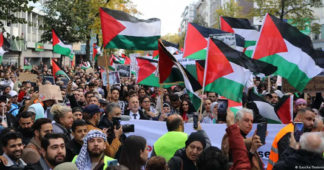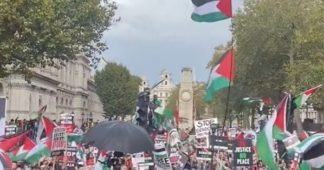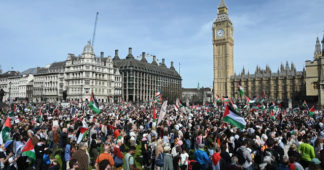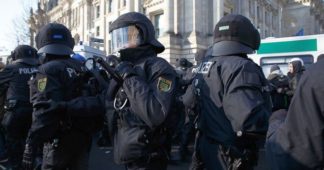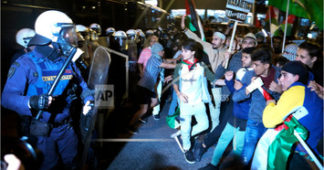Apr 22, 2024
The storming of the Palestine Congress on April 12 was the prelude to an escalation of police violence and the suppression of democratic rights on an enormous scale. The following Saturday, police stormed a demonstration against the ban on the congress and on Sunday they attacked a peaceful Palestine protest camp at the Bundestag (federal parliament). Finally, last Saturday, a pro-Palestinian demonstration was brutally broken up.
The demonstration against arms deliveries to Israel, which began at Potsdamer Platz, was part of weekly demonstrations against genocide that have always been peaceful from the participants’ point of view. Nevertheless, the Berlin police decided to storm the demonstration, arrest several participants, and later disperse the entire almost 2,000-strong demonstration.
The police prevented the start of the demonstration for half an hour at Potsdamer Platz. Finally, they announced over the loudspeaker that slogans had been shouted that “questioned Israel’s right to exist” and that this had “jeopardised public safety.”
The police asked all participants in the vicinity of the historic area to leave the demonstration. When no one complied with this vague request, they brutally stormed the demonstration and indiscriminately surrounded a handful of peaceful demonstrators and took them away.
Angela Niklaus, a candidate of the Sozialistische Gleichheitspartei (Socialist Equality Party, SGP) in the European elections, condemned this arbitrary police action and told the WSWS on the spot:
“Just like last weekend at the Palestine Congress, we see here again that the police are attacking a peaceful demonstration with the alleged reference to slogans that questioned Israel’s right to exist. In reality, all we heard the whole time were slogans condemning the genocide against the Palestinians, condemning the German government’s arms deliveries to Israel and demanding an immediate stop to the genocide”.
The police finally allowed the demonstration to start, only to stop it again an hour later, barricade the street and not let anyone through. After a loudspeaker van declared the demonstration over, the police stormed the encircled march and carried out arbitrary and brutal arrests.
One of the demonstrators present told the WSWS afterwards that a woman had fallen over and fainted during the police attack and had to be treated by paramedics. The police ignored this and continued their wave of arrests regardless. Broadcaster RBB reported that around 10 criminal investigations had been initiated.
SGP candidate Tamino Wilck, who was present at the demonstration, also condemned the police operation:
“The attacks here and in recent weeks against peaceful anti-war events make it clear that the ruling class can only implement its foreign policy of war and genocide if it also resumes its fascist police-state methods at home. They show the ruling class’ fear of the enormous opposition to their pro-war policy”.
Niklaus and Wilck conducted interviews with several participants at the opening rally, who expressed the enormous popular opposition to the genocide and its support by the coalition government.
Nina, who has family in the Gaza Strip, said she thought it was important to take to the streets in view of the “limited opportunities” in Germany “to speak out.” She particularly condemned the increasing police repression against opponents of the genocide: “As a democratic state, Germany [of course] always wants to stand on the front lines … but I find the double standards in certain areas, especially when it comes to Muslims and the Arab community and now especially the Palestinians, quite difficult.”
She also thought the planned de-registration of students at universties based on their political views “very bad.”
“I have friends myself who are affected by this, who are very scared,” she said. At the international school she attended “there were many conversations about reports of Palestine symbols.” Education also included differences of opinion. “And the fact that exmatriculation [expulsion] is now on the cards due to the political opinions of the parties is simply a restriction on the right to education and freedom of expression.”
She did not regard a two-state solution as a desirable solution, “simply because of the fact that you want everyone to live together, of course. … You have to reunite the country, under whatever name,” she said. “We’ve also seen it with South Africa. At the end of the day, apartheid must be condemned, any kind of repression must be condemned.”
A two-state solution would not help anyone, she continued: “If we really want to apply international law and take international law so seriously in its entirety, it is important that a state exists under which everyone lives, where no borders are drawn and no differences are sought.”
Karin, from Sweden, was at the demonstration to express her “solidarity with Palestine and especially the children… I’m just really, really sorry about what’s happening. The pictures are terrible. And I don’t understand why the whole world doesn’t just cry out and do something.” On the contrary, governments were supporting the genocide, she said.
Enna, who came to Germany as a refugee from Bosnia-Herzegovina, also thought the increasing police violence was “terrible.” “I have been taught that the police are a friend and helper. But I don’t feel safe at all. I don’t feel seen by the police at all, or rather I’m afraid of them.” In her opinion, many more people needed to take to the streets, “because the more we are, the less the police can somehow attack, I hope. Or they will become a totalitarian force.”
Angela Niklaus and Tamino Wilck are standing for the Sozialistische Gleichheitspartei in the European Parliament elections to give opposition to the genocide a voice and a perspective. Support our work and take part in the SGP’s election campaign!
We remind our readers that publication of articles on our site does not mean that we agree with what is written. Our policy is to publish anything which we consider of interest, so as to assist our readers in forming their opinions. Sometimes we even publish articles with which we totally disagree, since we believe it is important for our readers to be informed on as wide a spectrum of views as possible.
